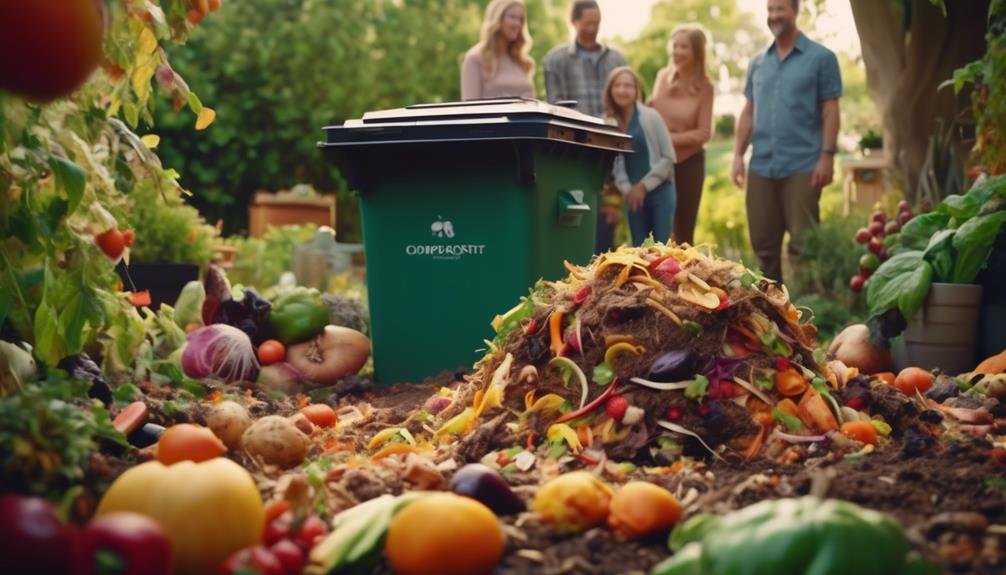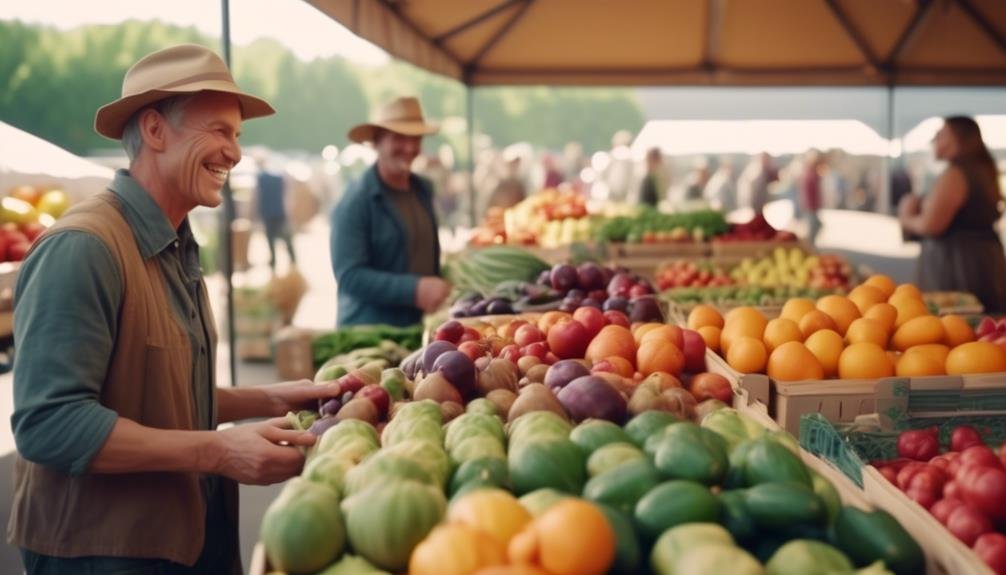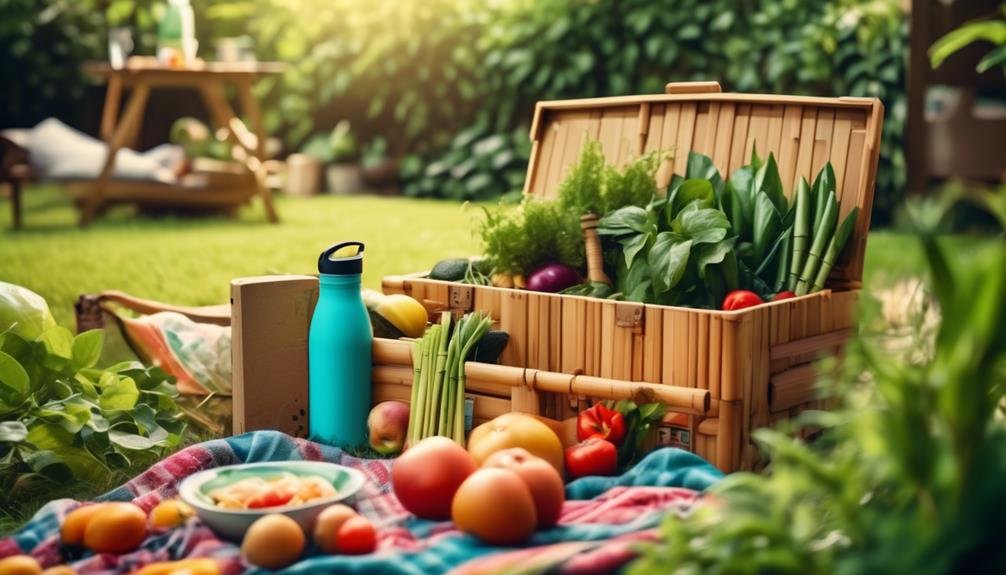"Cherishing Little Steps - A Haven for Baby and Family Journeys"
Eco-Friendly Feeding Tips
Are you looking for ways to make your feeding habits more eco-friendly? Wondering how you can reduce your carbon footprint and contribute to a healthier planet? Well, look no further.
In this discussion, we will explore some practical and effective eco-friendly feeding tips that not only benefit the environment but also promote sustainable living.
From reducing food waste to embracing meatless alternatives, there are plenty of simple yet impactful changes you can make in your daily routine.
So, let's dive in and discover how you can make a difference with your food choices.
Key Takeaways
- Implement food preservation techniques such as using airtight containers and freezing leftovers.
- Choose locally sourced ingredients to reduce your carbon footprint and support local farmers.
- Opt for organic and sustainable produce to reduce pesticide exposure and protect the environment.
- Embrace Meatless Mondays to reduce carbon emissions and water usage, and explore delicious plant-based alternatives.
Reduce Food Waste

To minimize food waste, it's crucial to implement simple practices that actively reduce the amount of discarded food. Two effective strategies for reducing food waste are food preservation and portion control.
Food preservation is a key technique in minimizing waste. By properly storing and preserving food, you can extend its shelf life and prevent spoilage. Utilize airtight containers or resealable bags to keep perishable items fresh for longer periods. Additionally, freezing leftovers or excess ingredients can help preserve their quality and prevent them from going to waste.
Portion control is another important practice to minimize food waste. By serving appropriate portion sizes, you can ensure that everyone is satisfied without overeating or leaving excess food on their plates. Consider using smaller plates and bowls, as they create an illusion of larger portions. Remember, you can always go back for seconds if needed.
Implementing these practices can have a significant impact on reducing food waste. According to the United Nations, about one-third of all food produced globally is wasted. By adopting food preservation techniques and practicing portion control, you can contribute to the reduction of this staggering figure.
Let's work together to create a more sustainable future by reducing food waste through these simple yet effective practices.
Choose Locally Sourced Ingredients
Choosing locally sourced ingredients is a sustainable and environmentally friendly way to support your community and reduce your carbon footprint. By purchasing food grown or produced nearby, you aren't only supporting local farmers but also minimizing the transportation required to bring food to your table. This means fewer greenhouse gas emissions from vehicles, which contribute to climate change.
Supporting local farmers is crucial for maintaining a vibrant and sustainable local food system. By purchasing their products, you're directly investing in your community's economy and ensuring their continued success. Local farmers often use sustainable farming practices, such as organic or regenerative methods, which have lower environmental impacts compared to conventional agriculture.
In addition to reducing your carbon footprint, choosing locally sourced ingredients also benefits your health. Local foods are usually harvested at peak ripeness, meaning they're fresher and more nutrient-dense. Moreover, buying local can help preserve the diversity of regional food varieties, including heirloom fruits and vegetables, which are often lost in large-scale industrial agriculture.
To find locally sourced ingredients, consider shopping at farmers markets, joining a community-supported agriculture (CSA) program, or even growing your own food. By making conscious choices about where your food comes from, you can make a positive impact on both your community and the environment.
Opt for Organic and Sustainable Produce

By opting for organic and sustainable produce, you can further reduce your environmental impact and support a healthier food system.
Here are four reasons why choosing organic and sustainable produce is beneficial:
- Reduced exposure to pesticides: Organic farming practices prohibit the use of synthetic pesticides, which means that the fruits and vegetables you consume are free from harmful chemicals. This not only ensures a safer food supply for you and your family but also protects the environment from the negative effects of pesticide use.
- Preservation of soil health: Organic farming emphasizes the use of natural fertilizers and crop rotation techniques, which help improve soil fertility and preserve its health. Healthy soil is essential for sustainable agriculture as it promotes the growth of nutrient-rich crops and reduces the need for chemical interventions.
- Conservation of water resources: Sustainable farming methods, such as drip irrigation and rainwater harvesting, minimize water wastage and promote efficient water use. By supporting sustainable agriculture, you contribute to the conservation of precious water resources and help mitigate the effects of water scarcity.
- Protection of biodiversity: Organic farming practices prioritize the preservation of biodiversity by creating habitats for beneficial insects and wildlife. This helps maintain a balanced ecosystem and prevents the loss of plant and animal species. By choosing organic produce, you actively support the protection of biodiversity and contribute to a more sustainable future.
Embrace Meatless Mondays
Embracing Meatless Mondays can be a sustainable and healthy choice for reducing your carbon footprint and improving your overall well-being. By choosing to go meatless for just one day a week, you can make a significant impact on the environment and your health.
| Benefits of Plant-Based Diets | Creative Meat Alternatives |
|---|---|
| Lower carbon emissions | Tempeh stir-fry |
| Reduced water usage | Lentil meatballs |
| Improved heart health | Portobello mushroom burgers |
Plant-based diets have been shown to offer a range of benefits. They have lower carbon emissions, as the production of plant-based foods requires less energy and generates fewer greenhouse gases compared to the production of meat. Additionally, plant-based diets have a lower water footprint, as meat production is water-intensive. By reducing your meat consumption, you can help conserve water resources.
Creativity is key when it comes to finding meat alternatives for Meatless Mondays. Tempeh stir-fry is a delicious and protein-packed option that can be easily incorporated into your meals. Lentil meatballs are another tasty alternative that can be used in pasta dishes or as a substitute for traditional meatballs. Portobello mushroom burgers are a popular choice for those craving a hearty and satisfying meal without the meat.
Ditch Single-Use Plastics

To further reduce your environmental impact and promote sustainability, it's important to address the issue of single-use plastics in your daily routine. These plastics, such as straws, bags, and utensils, contribute to the growing problem of plastic pollution in our oceans and landfills. By ditching single-use plastics and opting for reusable alternatives, you can make a significant difference in reducing waste and protecting the planet.
Here are four ways you can embrace eco-friendly packaging and reduce your reliance on single-use plastics:
- Invest in reusable water bottles and coffee cups: By carrying a reusable water bottle and coffee cup with you, you can avoid the need for disposable plastic bottles and cups. Not only will this reduce waste, but it will also save you money in the long run.
- Use reusable grocery bags: Instead of accepting plastic bags at the store, bring your own reusable bags. These bags aren't only sturdier and more durable, but they also help to eliminate the need for single-use plastic bags.
- Say no to plastic straws: Plastic straws are one of the most common single-use plastics found in our oceans. Choose alternatives like stainless steel or bamboo straws, or simply sip your drinks without a straw.
- Bring your own cutlery: When eating out or getting takeout, consider carrying your own reusable cutlery. This eliminates the need for disposable plastic forks, spoons, and knives.
Compost Food Scraps
Reducing food waste and promoting sustainability can be achieved by composting your food scraps. Composting is a simple and effective way to recycle your kitchen scraps, and one popular method is worm composting. Also known as vermicomposting, this process involves using worms to break down organic waste into nutrient-rich compost.
Worm composting offers numerous benefits. Firstly, it diverts food waste from landfills, where it would otherwise produce harmful greenhouse gases. Instead, it transforms your kitchen scraps into a valuable resource that can nourish your plants and gardens. Additionally, worm composting is a space-efficient option, making it ideal for those with limited outdoor space.
To get started with worm composting, you'll need a bin or container, bedding material such as shredded newspaper or cardboard, and of course, worms. Red wigglers are commonly used for this purpose. Place your kitchen scraps in the bin along with the bedding material and worms, and let nature do its work. Remember to avoid adding meat, dairy, and oily foods, as these can attract pests and create unpleasant odors.
Grow Your Own Food

You can maximize sustainability and reduce your carbon footprint by cultivating your own food at home. Not only is urban gardening a rewarding and therapeutic hobby, but it also allows you to have complete control over what you eat. Here are four reasons why growing your own food is a great eco-friendly choice:
- Freshness: When you grow your own food, you have access to the freshest produce possible. Imagine plucking a sun-ripened tomato from your backyard garden and enjoying its juicy flavor within minutes.
- Organic and Pesticide-Free: By growing your own food, you have the power to choose organic and pesticide-free methods. No more worrying about harmful chemicals on your plate.
- Reduced Food Miles: Growing your own food significantly reduces the distance it travels from farm to fork. This reduces transportation-related carbon emissions and supports local food systems.
- Hydroponic Farming: If you have limited space, you can try hydroponic farming. This soil-less gardening technique allows you to grow plants using nutrient-rich water solutions. Hydroponic farming uses less water and space compared to traditional farming methods.
Support Sustainable Fishing Practices
Supporting sustainable fishing practices is essential for preserving our oceans and ensuring a healthy ecosystem. By promoting marine conservation and encouraging responsible fishing practices, we can protect the delicate balance of marine life and maintain the abundance of seafood for future generations.
One way to support sustainable fishing is by choosing seafood that's certified sustainable. Look for labels such as the Marine Stewardship Council (MSC) or the Aquaculture Stewardship Council (ASC), which indicate that the fish has been caught or farmed in an environmentally responsible manner. These certifications ensure that the fishery or aquaculture operation meets strict standards for minimizing environmental impact and maintaining healthy fish populations.
Another important aspect of sustainable fishing is reducing bycatch. Bycatch refers to the unintentional capture of non-target species, such as dolphins, sea turtles, or seabirds. To minimize bycatch, support fisheries that use mitigation measures, such as turtle excluder devices or acoustic deterrent devices, which help reduce the accidental capture of these vulnerable species.
Additionally, it's crucial to abide by fishing regulations and size limits to allow fish populations to replenish. Pay attention to local fishing guidelines and restrictions, and consider joining community-led initiatives that promote responsible fishing practices.
Supporting sustainable fishing practices not only helps protect our oceans and preserve marine biodiversity, but it also ensures a steady supply of seafood for future generations. By making informed choices and advocating for responsible fishing, we can play a vital role in safeguarding our oceans and promoting a sustainable future.
Frequently Asked Questions
How Can I Incorporate Eco-Friendly Feeding Practices Into My Daily Routine?
You can easily incorporate eco-friendly feeding practices into your daily routine by focusing on eco friendly packaging and supporting sustainable farming practices. It's a simple way to make a positive impact on the environment.
Are There Any Specific Tips for Reducing Food Waste When Feeding a Large Family?
To reduce food waste when feeding a large family, start by meal planning and practicing portion control. Plan out your meals ahead of time and only serve the amount of food that everyone will eat, reducing the amount that goes to waste.
What Are Some Creative Ways to Compost Food Scraps if I Don't Have a Backyard?
Looking for creative ways to compost food scraps without a backyard? Try indoor composting! You can use a worm bin or Bokashi system to compost in small spaces. It's a great way to reduce waste and nourish your plants.
How Can I Ensure That the Seafood I Consume Is Sourced Sustainably?
To ensure the seafood you consume is sourced sustainably, look for certification programs like MSC or ASC. These programs verify that the seafood is caught or farmed in ways that minimize environmental impact and protect marine ecosystems.
Are There Any Alternatives to Single-Use Plastics That Are Eco-Friendly for Feeding On-The-Go?
Looking for eco-friendly alternatives to single-use plastics when feeding on-the-go? There are plenty! Reusable options made from sustainable materials like bamboo or stainless steel are not only better for the planet, but also stylish and convenient.
Conclusion
In conclusion, individuals can contribute to a more sustainable future by implementing eco-friendly feeding tips. This includes reducing food waste, choosing locally sourced ingredients, and embracing meatless Mondays. These actions help to reduce the environmental impact of our food choices and promote a more sustainable food system.
Additionally, ditching single-use plastics, composting food scraps, and supporting sustainable fishing practices further enhance these efforts. By reducing our consumption of single-use plastics, we can minimize the amount of waste that ends up in landfills and oceans. Composting food scraps can help divert organic waste from landfills, reducing greenhouse gas emissions and providing nutrient-rich soil for gardening.
Supporting sustainable fishing practices ensures that we are not depleting our oceans of their resources. This helps to maintain healthy fish populations and preserve marine ecosystems.
By making these data-driven and informed choices, we can make a positive impact on the environment and promote a healthier and more responsible way of nourishing ourselves and our planet. These actions not only benefit the planet but also contribute to our own well-being by promoting healthier eating habits and a more sustainable future.


